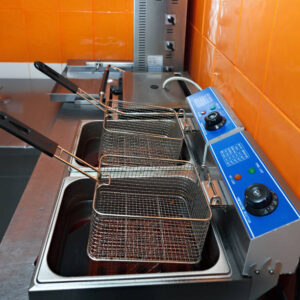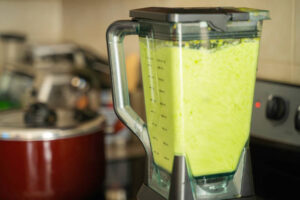Beginners Guide To Starting a Small Chops Business

Starting a small chops business in a location like Nigeria is a viable business because there is a demand for it.
From the elaborate spreads at weddings and birthdays to the essential accompaniments at corporate events and casual get-togethers, small chops are more than just appetizers; they are an integral part of the Nigerian communal experience.
For aspiring entrepreneurs with a passion for culinary arts and an eye for a promising market, launching a small chops business in Nigeria presents a compelling opportunity to enter the industry.
If you are looking for information on how to get started with a small chops business, then you are in the right place. In this article, I will be sharing
- The basic requirements needed to start a business
- Kitchen equipment that you need
- where you can get these quality kitchen equipments
Starting a small chops business is in no way different to starting a food business in Nigeria, you need understand what the food industry looks like from the inside by conducting a market research.
What are people looking for when they get a bite of their small chops? What location are you targeting? Do you want to only supply small chops to parties, or do you want to include parties and individual orders? How much are people willing to pay for these small chops? Can it cover the cost of production?
This and many more should be questions you consider before moving ahead with your small chops business. Your answers to these questions will help you to know who you want to sell to, what you want to sell, and where you want to sell.
It is also good to consider if you want to be a roadside small chops vendor or if you want to have a corporate office like 12 Baskets. This decision will determine the kind of kitchen equipment you will need, the kind of customers you want to sell to and the kind of business you want to build.
Steps To Start A Small Chops Business
1. Register your business
Having identified who you want to sell to and how you want to sell to them, decide on a business name and register it with the appropriate government organization. This will make your business official and position your business for growth. In the process of starting this business, you will need an official bank account to process transactions with your customers, and you will need the details from when you registered your business.
2. Train/acquire the skills
Small chops may seem simple, but perfecting the texture, taste, and presentation is key to standing out. Bad small chops can ruin your brand fast, especially in a competitive market.
Take time to learn how to make the basics: puff-puff, samosa, spring rolls, mosa, mini sausages, and meatballs by taking a hands-on training course or apprenticeship with a professional.
You should also learn how to plate and package your small chops because the way food looks affects how it’s perceived.
3. Get the essential equipment
The success of your small chops business isn’t just about recipes — it’s about efficiency, speed, and quality, all of which are driven by the equipment you use.
From preparing fillings to frying and packaging, having the right kitchen tools helps you reduce waste, serve consistent quality, and meet high-volume demands, especially during peak orders, events, and deliveries.
Trying to cut corners with substandard or household appliances can lead to delays, burnt products, oil waste, and even safety hazards. That’s why professional-grade industrial kitchen equipment is a non-negotiable investment for serious small-chops business owners.
This equipment includes:
-
-

A deep fryer in a Nigerian restaurant
Gas Cooker or Stove: Your day-to-day operations start here, whether it’s frying puff-puff, steaming fillings, or cooking sauce. Industrial gas cookers heat up faster, last longer, and support multiple burners to help you multitask with ease.
-

A gas cooker in a commercial kitchen
-
- Deep Fryer: A quality deep fryer keeps your oil at the right temperature, producing perfectly golden chops every time while minimizing oil waste. It also improves hygiene and speeds up frying during bulk orders.
- Mixing Bowls & Utensils: this sounds simple, but in a production-heavy kitchen, durable, food-grade bowls and utensils help you work faster and cleaner. From mixing puff-puff batter to tossing fillings, they keep your workflow efficient and organized.
-

An industrial blender in use
- Industrial Blender: The difference between a home-use blender and an industrial one is capacity, power, and durability. Whether you’re blending pepper for spring roll sauce or onions for samosa fillings, a high-capacity blender ensures you’re not stuck blending in batches all day.
-
- Knives & Cutting Boards: Working with the proper chopping tools reduces prep time and improves safety. Industrial-grade knives stay sharper for longer, and food-safe cutting boards help maintain hygiene, especially when handling both veggies and proteins.
- Serving Trays: Presentation matters, especially if you cater to events or office deliveries. Sturdy, stylish serving trays ensure your small chops look professional and appealing.
- Packaging Materials: Get branded takeaway boxes, foil wraps, or clear containers to protect your food during transit and also leave a lasting impression. Packaging is part of your marketing, it’s what people see before they even taste your small chops.
You can find all these equipment when you visit our website, www.afess.ng or call any of our sales representatives.
4. Get a Business Space
You don’t need a big space to start. Many successful small-chop brands started from home. However, your space must be clean, safe, and organized for food prep. You can consider any of this options:
-
Home kitchen: Good for starting with small orders or deliveries.
-
Rented shop space: Ideal for walk-in customers and better visibility.
Regardless of the option you are going with, ensure proper ventilation and storage, and comply with local health and safety standards.
5. Raw Materials & Ingredients
Freshness is everything in the food business. Sourcing high-quality raw materials improves taste, customer satisfaction, and guarantees repeat orders.
These are some essentials you need:
-
Flour, sugar, yeast: for puff-puff and doughs.
-
Vegetables: cabbage, carrots, green beans for fillings.
-
Protein: minced beef, chicken, or fish.
-
Spices: curry, thyme, seasoning cubes, pepper, garlic, etc.
-
Oil: good-quality vegetable oil for frying.
Buy in bulk to save costs, but have proper storage (like a chest freezer or dry shelf) to avoid spoilage.
6. Packaging & Branding
Attractive, branded packaging makes your business look professional and memorable. Customers love to share well-packaged food online which gives you quality and unpaid marketing.
For your packaging you want to consider, branded paper boxes or takeaway packs, stickers with your logo and contact details, food-grade nylon wraps or foil for hot items and a Thank-you notes or flyers to add a personal touch.
7. Marketing
Marketing is what gets you seen by the people who need your small chops. No matter how good your chops are, people need to know you exist.
You can use :
- WhatsApp: Use status, broadcast lists, and groups to share pictures and customer feedback.
- Instagram: Post photos, behind-the-scenes videos, and customer reviews.
- Facebook: Run targeted ads to reach event planners, students, and office workers.
You can also partner with event planners or caterers for bulk orders and more exposure.
8. Setup a Payment & Delivery Systems
Seamless payment and reliable delivery systems makes it easy for customers to order from you and keep coming back.
For deliveries, use dispatch riders, Bolt Food, or hire a dedicated delivery staff. Always confirm payments before delivery, and communicate delivery timelines clearly.
Conclusion
Starting a small chops business is exciting, but to build a brand that customers trust and come back to, you need more than just great recipes.
You need the right equipment that guarantees consistency, speed, hygiene, and professionalism. These tools don’t just make your life easier—they directly affect your profit margins, customer satisfaction, and ability to scale.
That’s where Afess Industrial Kitchen Equipment comes in.
We don’t just sell products we equip Nigerian food business owners with reliable, long-lasting, and purpose-fit industrial equipment designed to help you succeed from day one. Whether you’re frying puff-puff for your first order or setting up for a major catering event, we’ve got the gear and guidance you need to do it with excellence.
Are you ready to take the first step? Visit our website or stop by our showroom to get started today!
More articles for you
Buying vs. Leasing Kitchen Equipment: Which is Better for Nigerian Restaurants?
How to Attract More Customers to Your Restaurant in Nigeria
Top 10 Must-Have Kitchen Appliances for Food Vendors in Nigeria